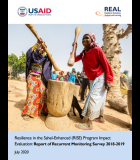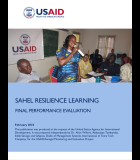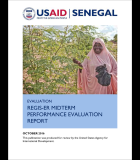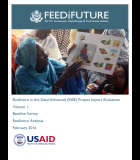Sahel Resilience and Learning (SAREL)
Following repeated large-scale humanitarian emergencies in the Sahel, USAID recognized that continuing to treat these recurrent crises as acute emergencies is extremely costly and does not effectively address their underlying causes. Thus, USAID’s Resilience in the Sahel Enhanced (RISE) initiative has realigned existing and new humanitarian and development assistance efforts to strengthen resilience in agro-pastoral and marginal agriculture livelihood zones of the Sahel. USAID will reduce chronic vulnerability by increasing economic well-being, strengthening institutions and governance, and improving health and nutrition status.
Activity Description
The Sahel Resilience Learning Project (SAREL) works to strengthen the capacity of key stakeholders to engage in adaptive, evidence-based learning in order to promote the adoption of methods and innovations that best enhance resilience in the region. SAREL accomplishes this through the following objectives:
- Test, expand and accelerate the adoption of proven resilience-enhancing technologies and innovations
- Develop, test, and promote widespread adoption of new models that integrate humanitarian and development assistance
- Promote ownership, build the capacity of national and regional institutions, and coordinate humanitarian and development interventions
- Address gender issues key to resilience and growth
- Create a knowledge management database that will house a baseline assessment
SAREL’s main activities include:
- Collection and review of examples of successful, gender-sensitive resilience practices, to promote collaborative learning with RISE partners in order to expand the scale of these practices across the region
- Sharing of best practices from the region and encouraging innovation and adoption through interactive community radio programs
- Organizing learning forums to bring together farmers and international development experts to exchange experiences and ideas on resilience strengthening and identify new approaches for integrating humanitarian and development assistance
- Building understanding of the purpose, merits and technologies of collaborative, adaptive learning and providing assistance and mentoring to partner institutions to incorporate learning as central to their plans and operations
- Designing and supervising RISE baseline, mid-term and final impact assessments using mixed methods
- Establishing a resiliency center of excellence portal, which will serve as a technological means to foster and enhance resilience collaboration across the region
Expected Outcomes
The project expects an:
- Identification and adoption of innovative, easily implemented approaches and activities to strengthen resilience of communities
- Growing convergence of resilience strategies and approaches driven by a) adoption of collaborative learning and adaptation methods, b) emergence of thriving and active communities of practice, and c) improved capacity for rigorous evaluation
Actual Outcomes
The project has seen a:
- Completion of field data collection for RISE baseline survey in Niger and Burkina Faso involving 100 villages and 2,500 households.
- Broad dissemination of resilience best practices and lessons learned presentations from the April 2015 collaborative learning workshops held in Niger (April 1-2) and Burkina (April 14-15) to members of the Sahel Resilience Community of Practice.
- Launch of OASIS-led ethnographic field research focused on Safe Spaces approach to empowering adolescent girls, in Maradi region.
- Identification of 202 Sahel Resilience Community of Practice (SR CoP) members
- 200 best practice techniques, technologies, innovations and approaches tested in Niger and Burkina Faso that contribute to resilience-building efforts






